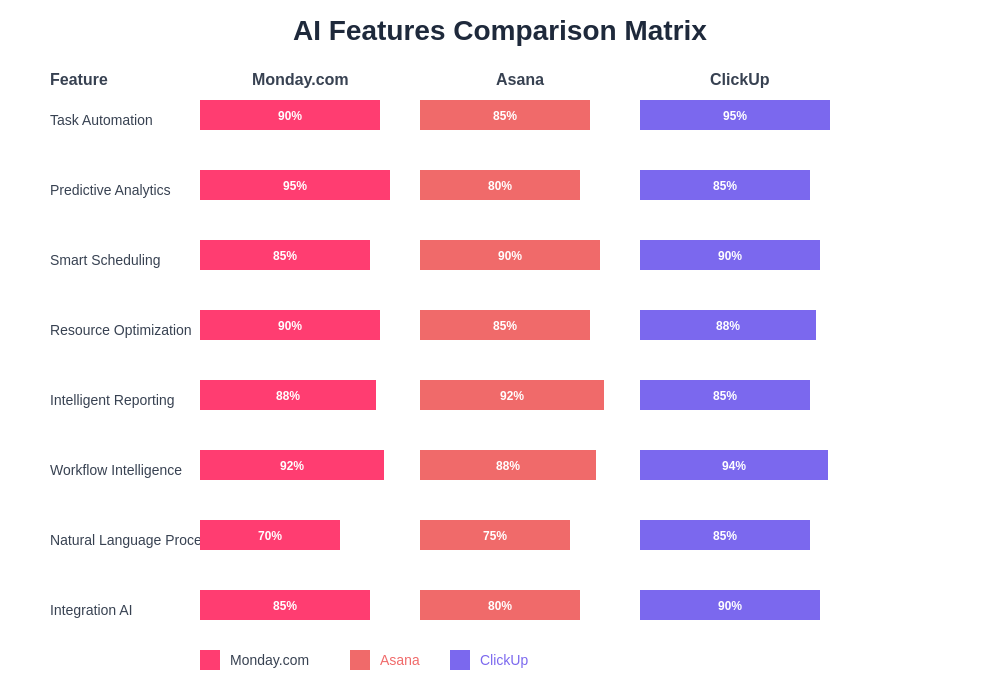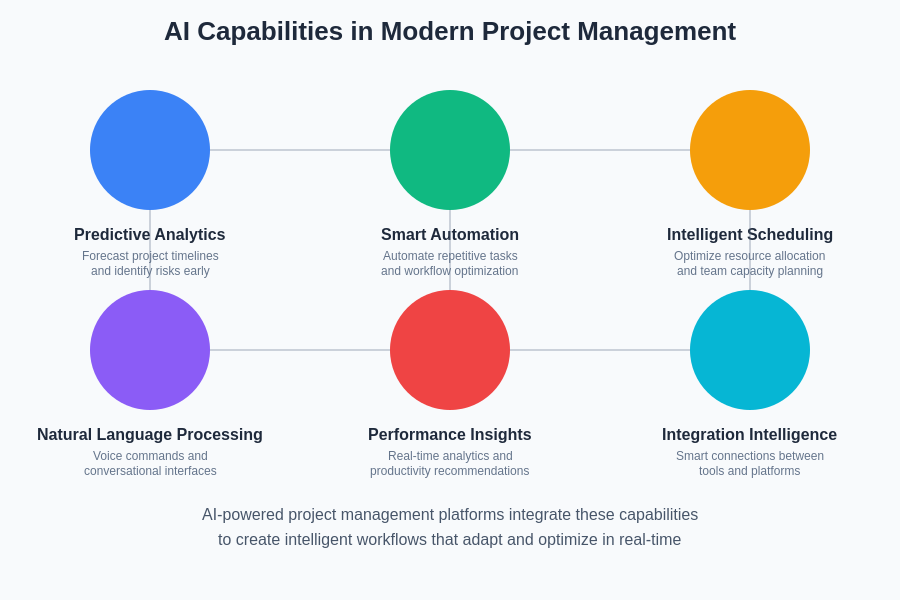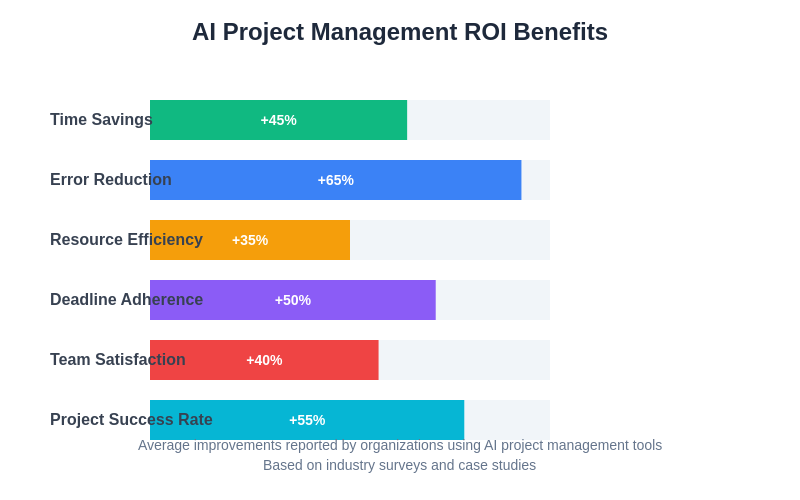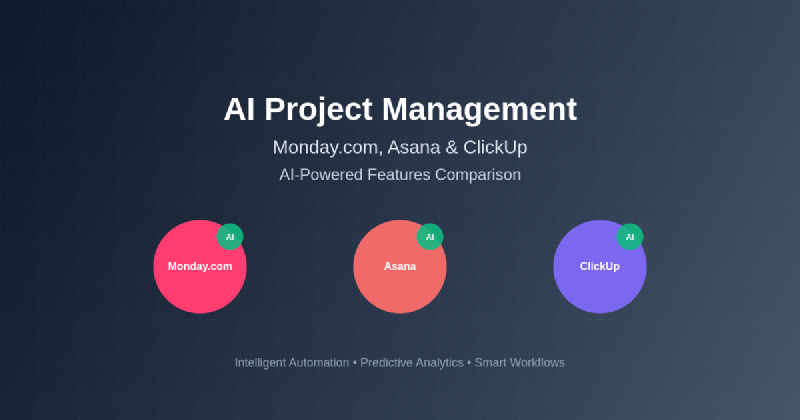The evolution of project management has reached a transformative milestone with the integration of artificial intelligence into leading platforms, fundamentally reshaping how teams plan, execute, and monitor their work. Monday.com, Asana, and ClickUp have emerged as pioneering forces in this revolution, each developing sophisticated AI capabilities that promise to eliminate administrative overhead, enhance decision-making processes, and unlock unprecedented levels of team productivity through intelligent automation and predictive analytics.
Explore the latest AI innovations in project management to discover cutting-edge features and emerging trends that are revolutionizing how modern teams collaborate and achieve their objectives. The convergence of artificial intelligence with project management represents more than technological enhancement; it signifies a fundamental shift toward intelligent work orchestration that adapts to team dynamics, predicts potential obstacles, and optimizes resource allocation in real-time.
The AI Revolution in Project Management
The traditional approach to project management has long been characterized by manual task assignment, reactive problem-solving, and time-consuming status updates that often detract from actual productive work. The integration of artificial intelligence has fundamentally transformed this landscape by introducing predictive capabilities, automated workflow optimization, and intelligent resource management that anticipates needs rather than merely responding to them. This paradigm shift has enabled project managers to focus on strategic oversight and creative problem-solving while AI handles routine operational tasks with unprecedented accuracy and efficiency.
Modern AI-powered project management platforms leverage machine learning algorithms to analyze historical project data, team performance patterns, and resource utilization trends to provide actionable insights that drive better decision-making. These systems continuously learn from user interactions, project outcomes, and team behaviors to refine their recommendations and improve their predictive accuracy over time. The result is a dynamic project management environment that becomes increasingly intelligent and valuable as teams continue to use and interact with these platforms.
Monday.com: Intelligent Work Operating System
Monday.com has positioned itself as a comprehensive work operating system that harnesses artificial intelligence to create adaptive workflows and intelligent project insights. The platform’s AI capabilities extend far beyond simple automation, incorporating sophisticated machine learning models that analyze team productivity patterns, predict project bottlenecks, and suggest optimal resource allocation strategies based on historical performance data and current project requirements.
The platform’s AI-powered features include intelligent task prioritization that considers multiple factors such as deadlines, dependencies, team capacity, and strategic importance to recommend optimal work sequences. This dynamic prioritization system continuously adjusts recommendations based on changing project conditions, team availability, and emerging priorities, ensuring that teams always focus their efforts on the most impactful activities at any given moment.
Monday.com’s predictive analytics capabilities represent a significant advancement in project management intelligence, utilizing complex algorithms to forecast project completion dates, identify potential risks, and recommend preventive measures before issues become critical. The system analyzes patterns in task completion rates, team workload distribution, and historical project performance to provide accurate timeline predictions and resource requirement forecasts that enable proactive project management rather than reactive crisis management.
Enhance your project management with AI assistance from Claude to leverage advanced analytical capabilities for strategic planning and intelligent workflow optimization. The integration of multiple AI tools creates a comprehensive ecosystem that supports every aspect of project lifecycle management from initial conception through successful delivery.
Asana: AI-Powered Work Intelligence
Asana has developed a sophisticated AI infrastructure that focuses on intelligent work coordination and automated project optimization through its innovative Goals and Intelligence features. The platform’s artificial intelligence capabilities are designed to eliminate administrative overhead while providing deep insights into team performance, project health, and strategic alignment that enable data-driven decision-making at every organizational level.
The platform’s AI-driven task management system automatically categorizes work items, suggests optimal assignments based on team member skills and current workload, and identifies potential scheduling conflicts before they impact project timelines. This intelligent coordination ensures that work is distributed efficiently across team members while maintaining optimal balance between individual capacity and project requirements, resulting in improved productivity and reduced burnout risk.
Asana’s intelligent reporting and analytics capabilities leverage machine learning to generate comprehensive project insights that go beyond traditional metrics to provide actionable recommendations for process improvement and performance optimization. The system analyzes communication patterns, task completion trends, and collaboration effectiveness to identify opportunities for workflow enhancement and team development that might not be apparent through conventional project monitoring approaches.
The platform’s AI-powered goal tracking functionality creates intelligent connections between daily tasks and strategic objectives, automatically measuring progress toward organizational goals and identifying activities that contribute most effectively to desired outcomes. This strategic alignment capability ensures that team efforts remain focused on high-impact work that drives meaningful business results rather than getting lost in operational busy work that provides little strategic value.
ClickUp: All-in-One AI Integration
ClickUp has embraced a comprehensive approach to AI integration that spans every aspect of project management, from intelligent task creation and automated workflow optimization to predictive resource planning and intelligent team coordination. The platform’s AI capabilities are designed to create a seamless project management experience that adapts to team preferences, organizational requirements, and project complexities through continuous learning and optimization.
The platform’s AI-powered task management system includes intelligent task generation that can automatically create comprehensive project plans based on high-level objectives, historical project templates, and team capacity analysis. This capability enables rapid project initialization while ensuring that all necessary components are included and properly sequenced according to best practices and organizational standards, significantly reducing the time required for project setup and planning phases.
ClickUp’s intelligent automation features extend beyond simple rule-based workflows to include sophisticated AI-driven process optimization that learns from team behaviors and project outcomes to suggest improvements and automatically implement efficiency enhancements. The system continuously monitors workflow performance, identifies bottlenecks and inefficiencies, and recommends or implements optimizations that improve overall project velocity and team productivity.
The platform’s AI-enhanced collaboration features include intelligent notification management that learns individual preferences and work patterns to deliver relevant information at optimal times while filtering out unnecessary distractions. This personalized communication optimization ensures that team members receive critical updates when they need them most while maintaining focus on their primary work responsibilities without constant interruption from non-essential notifications.
Comparative Analysis of AI Capabilities
When evaluating the AI capabilities of these leading project management platforms, it becomes evident that each has developed distinct strengths and specializations that cater to different organizational needs and project management philosophies. Monday.com excels in providing comprehensive work operating system functionality with sophisticated predictive analytics and intelligent resource management that scales effectively across large organizations with complex project portfolios and diverse team structures.
Asana’s strength lies in its intelligent work coordination capabilities and strategic goal alignment features that create clear connections between daily activities and organizational objectives. The platform’s AI-powered insights provide exceptional visibility into team performance patterns and project health metrics that enable proactive management interventions and continuous process improvement initiatives that drive long-term organizational success.
ClickUp’s comprehensive AI integration approach offers the most extensive feature set for teams seeking an all-in-one solution that combines project management, collaboration, and productivity optimization in a single platform. The system’s intelligent task generation and automated workflow optimization capabilities provide exceptional value for teams that require flexible project management tools that can adapt to diverse work styles and project requirements.

The comparative analysis of AI capabilities across these leading platforms reveals distinct strengths and specialization areas that cater to different organizational needs and project management philosophies, enabling informed decision-making based on specific requirements and strategic objectives.
Leverage advanced AI research capabilities with Perplexity to conduct comprehensive analysis of project management trends and make informed decisions about platform selection and implementation strategies. The combination of multiple AI tools creates a powerful research and analysis framework that supports strategic technology adoption and optimization initiatives.
AI-Driven Task Automation and Workflow Optimization
The automation capabilities provided by these AI-powered project management platforms extend far beyond simple rule-based triggers to include sophisticated machine learning systems that understand context, predict needs, and optimize workflows based on real-time analysis of team performance and project requirements. These intelligent automation features eliminate repetitive administrative tasks while ensuring that critical project activities receive appropriate attention and resources at the optimal time for maximum impact and efficiency.
Advanced workflow optimization algorithms analyze team collaboration patterns, task completion sequences, and resource utilization trends to identify opportunities for process improvement and efficiency enhancement. These systems can automatically adjust project schedules, reallocate resources, and modify workflow sequences to accommodate changing priorities, unexpected obstacles, or emerging opportunities without requiring manual intervention from project managers or team leaders.
The predictive automation capabilities of these platforms enable proactive project management by identifying potential issues, resource conflicts, and timeline risks before they become critical problems that require emergency intervention. This forward-looking approach to project management allows teams to maintain consistent progress toward their objectives while minimizing disruptions and maintaining high levels of productivity and morale throughout the project lifecycle.

The comprehensive integration of artificial intelligence capabilities creates a sophisticated ecosystem where predictive analytics, smart automation, intelligent scheduling, natural language processing, performance insights, and integration intelligence work together to transform traditional project management into a dynamic, adaptive, and intelligent orchestration system.
Intelligent Resource Management and Capacity Planning
Resource management represents one of the most challenging aspects of project management, requiring careful balance between team capacity, project requirements, skill availability, and strategic priorities. AI-powered platforms have revolutionized this process by providing intelligent capacity planning capabilities that analyze multiple variables simultaneously to recommend optimal resource allocation strategies that maximize productivity while maintaining sustainable workload levels for all team members.
These sophisticated systems continuously monitor team workload distribution, skill utilization patterns, and project demands to identify potential capacity issues and recommend proactive adjustments before problems impact project timelines or team performance. The AI algorithms consider factors such as individual productivity patterns, skill development opportunities, and strategic priorities to create resource allocation recommendations that support both immediate project needs and long-term team development objectives.
The predictive capacity planning features enable organizations to make informed decisions about hiring, training, and project scheduling by providing accurate forecasts of future resource requirements based on current project pipelines, historical performance data, and strategic growth projections. This forward-looking approach to resource management ensures that teams have the necessary capacity and capabilities to meet their commitments while maintaining high quality standards and sustainable work practices.
Advanced Analytics and Performance Insights
The analytics capabilities provided by AI-powered project management platforms go far beyond traditional reporting to provide deep insights into team performance, project health, and organizational effectiveness through sophisticated data analysis and machine learning algorithms. These systems continuously collect and analyze vast amounts of project data to identify patterns, trends, and correlations that would be impossible to detect through manual analysis or traditional reporting methods.
Intelligent performance analytics provide comprehensive visibility into team productivity patterns, collaboration effectiveness, and project success factors that enable data-driven decision-making and continuous improvement initiatives. The AI systems can identify high-performing teams and practices, analyze factors contributing to project success, and recommend strategies for replicating successful approaches across other teams and projects within the organization.
The predictive analytics capabilities enable project managers to anticipate potential problems, identify emerging opportunities, and make proactive adjustments to project plans and resource allocation strategies based on real-time analysis of project performance data and external factors that might impact project outcomes. This forward-looking approach to project management enables teams to maintain consistent progress toward their objectives while minimizing risks and maximizing opportunities for success.

The quantifiable benefits of implementing AI-powered project management solutions demonstrate substantial returns on investment across multiple performance metrics, with organizations reporting significant improvements in time savings, error reduction, resource efficiency, deadline adherence, team satisfaction, and overall project success rates that justify the adoption of these advanced technological solutions.
Integration Capabilities and Ecosystem Compatibility
Modern project management platforms must seamlessly integrate with existing organizational tools and systems to provide maximum value and avoid creating additional complexity or workflow disruption. The AI capabilities of these platforms extend to intelligent integration management that can automatically configure connections, synchronize data, and optimize workflows across multiple systems to create a cohesive and efficient work environment.
The sophisticated API management and data synchronization capabilities ensure that information flows seamlessly between project management platforms and other organizational systems such as customer relationship management tools, financial systems, and communication platforms. This integration intelligence eliminates data silos and reduces the manual effort required to maintain consistency across multiple systems while ensuring that all stakeholders have access to current and accurate project information.
The ecosystem compatibility features include intelligent workflow automation that can trigger actions across multiple systems based on project events, status changes, or performance metrics. This cross-platform automation capability enables organizations to create sophisticated workflow processes that span multiple tools and systems while maintaining centralized control and visibility through the project management platform.
Security and Compliance Considerations
The implementation of AI-powered project management systems requires careful consideration of security, privacy, and compliance requirements that may vary significantly across different organizations and industries. Leading platforms have implemented comprehensive security frameworks that include advanced encryption, access controls, and audit capabilities designed to protect sensitive project data while maintaining compliance with relevant regulatory requirements and industry standards.
The AI algorithms themselves are designed with privacy protection in mind, utilizing techniques such as federated learning and differential privacy to extract insights from project data without exposing sensitive information or compromising individual privacy. These advanced privacy protection measures ensure that organizations can benefit from AI-powered insights while maintaining strict control over their confidential information and intellectual property.
Compliance management features include automated documentation generation, audit trail maintenance, and regulatory reporting capabilities that help organizations meet their compliance obligations while minimizing administrative overhead. The AI systems can automatically identify compliance-relevant activities, generate required documentation, and maintain detailed records of all project activities and decisions to support audit processes and regulatory requirements.
Future Developments and Emerging Trends
The future of AI-powered project management promises even more sophisticated capabilities as machine learning algorithms become more advanced and organizations generate larger volumes of project data for analysis and optimization. Emerging trends include the development of more sophisticated predictive models that can account for external factors such as market conditions, seasonal variations, and industry trends when forecasting project outcomes and resource requirements.
The integration of natural language processing capabilities will enable more intuitive interaction with project management systems through conversational interfaces that allow team members to query project status, request information, and initiate actions using natural language commands. This development will further reduce the learning curve associated with project management tools while making advanced functionality accessible to all team members regardless of their technical expertise.
Advanced personalization capabilities will create customized project management experiences that adapt to individual work styles, preferences, and responsibilities while maintaining consistency with organizational standards and project requirements. These personalized interfaces will optimize information presentation, notification timing, and feature accessibility to maximize individual productivity while supporting effective team collaboration and coordination.
The continued evolution of AI-powered project management platforms will likely include more sophisticated integration with emerging technologies such as augmented reality for project visualization, blockchain for secure project documentation, and Internet of Things devices for real-time project monitoring and status updates. These technological convergences will create new opportunities for enhanced project visibility, improved collaboration, and more effective project management across diverse industries and use cases.
Disclaimer
This article is for informational purposes only and does not constitute professional advice. The information provided is based on publicly available features and capabilities of the mentioned platforms as of the publication date. Organizations should conduct their own evaluation and testing to determine the suitability of these platforms for their specific requirements. Features and capabilities may change over time, and individual results may vary based on implementation, team size, and organizational factors. Readers should consult with qualified professionals when making technology adoption decisions.
